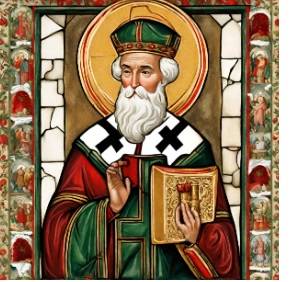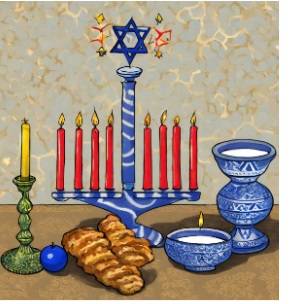Religious Holidays in December
It’s December and for many that means Christmas celebrations, but did you know there are many other religious holidays for the month of December?
Dec. 6: Saint Nicholas Day — Christian
This holiday honours the birth of Saint Nicholas, the 4th-century bishop of Myra. St. Nicholas is the patron saint of Russia and Greece, of a number of cities, and of sailors and children, among many other groups.
He was noted for his generosity, as a kindly old man, who was united with old Nordic folktales of a magician who punished naughty children and rewarded good children with presents. The resulting image of Santa Claus in the United States crystallised in the 19th century, and he has ever since remained the patron of the gift-giving festival of Christmas. In Britain he was largely replaced with Father Christmas.

Dec. 7 to 14: Hanukkah — Judaism

THis is the eight-day Jewish festival of lights, which celebrates the Maccabean revolt in Egypt. In their victory the Macabees, led by Judah, reclaimed the Holy Temple in Jerusalem and rededicated it to their God. They only had enough oil to ignite the temple light for one night, and yet the light burned for eight days.
It runs from sundown on the 7th until sundown on the 15th. Eight candles are lit with a menorah to honour the holiday. It is celebrated by lighting the menorah, playing games, exchanging gifts, and enjoying traditional foods.
Dec. 8: Immaculate Conception — Catholic
In the lead-up to Jesus’ birthday celebration on Christmas Day, Catholics celebrate the day of Immaculate Conception to honour his mother Mary, who they say was preserved from original sin for her entire life.
Dec. 8: Rohatsu (Bodhi Day) — Buddhist
This holiday celebrates the historical Buddha’s decision and vow to sit under the Bodhi tree until he reached spiritual enlightenment. The story goes that, rejecting the luxurious lifestyle of a prince, Siddharta left the comforts of the palace at the age of 29 and went on a journey of deep introspection to seek meaning in life.
Buddhists commemorate this day by meditating, studying the ‘dharma’ (‘universal truth or law’), chanting sutras (Buddhist texts), and performing kind acts towards other beings. Some people mark the day in a more traditional sense by cooking a meal of tea and cakes.
Advent – Christian
Advent is a Christian tradition that marks the period of preparation and anticipation leading up to the celebration of the birth of Jesus Christ. It typically begins on the fourth Sunday before Christmas and lasts for four weeks. The word "advent" itself means "coming" or "arrival." During this time, Christians engage in various practices and rituals, such as lighting Advent candles on an Advent wreath, reading daily Advent devotionals, and reflecting on the significance of Christ's coming into the world. It is a time of spiritual reflection, hope, and expectation for believers.
Dec. 22: Solstice —Pagan and Wicca
Solstice is the point in the year when the earth is farthest away from the sun. The celebration of Winter Solstice takes place on the shortest day and longest night of the year. The Pagan celebration of Winter Solstice (also known as Yule) is one of the oldest winter celebrations in the world.
Pagans and Wicca believers will celebrate that event through Yule, in which believers also honour “the winter-born king, symbolised by the rebirth of the sun”. Traditions of decorating evergreens dates back to many ancient civilisations, including the Romans. Today, Pagans decorate a pine, fir, cedar, juniper, or spruce as their Yule tree.
25th December - Christmas Day - Christians
December 26th to January 1st, Kwanzaa
It commemorates the birth of Jesus Christ. It is widely celebrated with religious services, gift-giving, festive decorations, and gatherings with family and friends.
This is a week-long celebration that honours African heritage and culture. It involves lighting the Kinara (candle holder), storytelling, music, dancing, and reflecting on seven principles known as the Nguzo Saba.
December 31st New Year's Eve
Marks the end of the Gregorian calendar year (the calendar system we use today, was first introduced in 1582). People often gather for parties, fireworks, and countdowns to welcome the upcoming year.
Our lives run at such a fast pace these days and everything is mobile – banking, bookings, our social lives! What about learning? Learning takes place in so many ways, every day of your life you learn new things. That's why I love working at The National Training Academy, we can make a real difference.
A bit about me...
A couple of years ago I took the plunge and moved to the coast in North Wales, not knowing anyone, not knowing the area it was a real leap of faith, but it was the best move ever! Through lockdown it has been great, having beaches and mountains on my doorstep I'm truly blessed. The great outdoors is one of lives simple pleasures.
In my spare time I love riding my Triumph Tiger (there's a growing number of female motorcyclists out there!). I love cooking, lockdown has given me the opportunity and time to try many new recipes, curries seem to have become a special favourite.
Author: Claire Arthur
Visit Claire on LinkedIn
